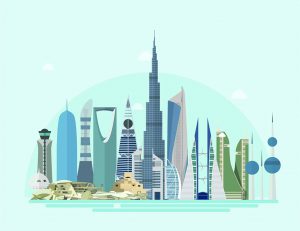Abu Dhabi / WAM
The European Union (EU) organised a webinar titled “EU-GCC Webinar on Energy Efficiency in the Building Sector: A Key Driver for Net-Decarbonisation”.
Held in the context of the EU Climate Diplomacy Weeks 2022 and ahead of COP27, the webinar brought together around 100 European and Gulf policymakers, representatives of the private sector, including industrial and building energy-users, architects, engineers, smart technology providers, as well as researchers and academics.
The event aimed at fostering closer EU-GCC ties on climate change and inspire real action through best practice exchange and untapped opportunities for EU-GCC partnerships.
The experts addressed the current debate around climate change, the challenges of energy efficiency in the building sector as well as the required strategies, policies and regulations to enable energy efficiency.
Furthermore, they discussed investment and finance, business models within the energy efficiency sector, and the need for sustainable growth and development at local and global levels. The experts also put forward actionable solutions to tackle issues such as low energy efficiency, chronic dependence on fuel subsidies, and the active role that clean energy can play to target more sustainable, efficient and cost-effective methods for using energy.
The event called for collective action through quick, cross-sectoral and human-centred interventions as energy efficiency will play a vital role in the energy transition as one of the key drivers for net-decarbonisation. Investments in energy efficiency will foster sustainable growth, which, in the short term, will be critical for recovery from the COVID-19 crisis, while ensuring greater energy security.
Speaking ahead of the webinar, Andrea Matteo Fontana, EU Ambassador to the United Arab Emirates, said, “The EU is fully engaged in climate action globally and has set the ambitious goal of becoming the world’s first climate neutral continent by 2050. To this end, we have set legally binding targets for ourselves (including intermediary targets for 2030); which require all public and private sector stakeholders to work together. Maximising energy efficiency in the building sector is an important pillar of the green energy transition, and we look forward to working with our Emirati and Gulf partners to drive together the decarbonisation agenda forwardâ€.
Dr. Mohamed Al Rashidi, Director of Energy, Secretariat General of the Gulf Cooperation Council (GCC), said, “The GCC countries are embarking on a clean energy transition pathway, which targets more sustainable, efficient, and cost-effective methods for using energy. We are witnessing a real change happening in the region, with exciting visions and ambitious projects launched. This creates an attractive environment for the GCC and EU entities to be partners in this endeavourâ€.
Silvia Crescimbeni, Policy Officer at DG CLIMA of the European Commission, added, ‘‘Climate change is the defining challenge of our generation. With the right policies and investments, we can revert the challenge into an opportunity to create healthier, more sustainable and more resilient growth models. Scaling up investments in energy efficiency and savings can help us advance towards our net-zero targets, while creating new jobs and economic opportunities.’’
Energy efficiency and renewable energy, represent one of the main pillars for any green energy transition. Both policies can provide over 90% of the energy-related CO2 emission reductions that are required, using technologies that are safe, reliable, affordable, and widely available. Energy efficiency in buildings plays an essential role.
Energy efficiency measures and technologies offer solutions suited for small, medium, and large-scale applications that can be implemented in different sectors of the economy such as buildings and industry. In addition, energy efficiency provides significant co-benefits in terms of job and SMEs creation, revenue generation, interaction with research and innovation, increasing competitiveness and an improvement of companies’ corporate images.
In May 2022, the European Union introduced its Joint Communication on a Strategic Partnership with the Gulf, aiming to broaden and deepen the EU’s cooperation with the Gulf Cooperation Council and its Member States. The Communication presents concrete proposals to strengthen cooperation on energy, green transition and climate change, trade and economic diversification, regional stability and global security, humanitarian and development challenges, and closer people-to-people contacts.
 The Gulf Time Newspaper One of the finest business newspapers in the UAE brought to you by our professional writers and editors.
The Gulf Time Newspaper One of the finest business newspapers in the UAE brought to you by our professional writers and editors.
